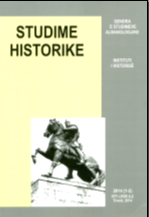ASPEKTE TË VEPRIMTARISË SË INSTITUCIONEVE POLITIKE NË SHQIPËRI GJATË VITIT 1922
SOME ASPECTS OF THE ALBANIAN POLITICAL INSTITUTIONS’ ACTIVITY DURING 1922
Author(s): Albana MemaSubject(s): History
Published by: Qendra e Studimeve Albanologjike
Keywords: ALBANIAN POLITICAL INSTITUTIONS’ ; ACTIVITY DURING ; 1922
Summary/Abstract: The political turmoil of December 1921 and, the parliament and government decisions that followed them, with regard to the organizers of the coup d ’etat, became a source of widespread discontent among the opponents of Zogu and although they had been moderate served as a reason for anti- government uprisings. The uprising of March 1922 was against a legitimate government which held a considerable majority in the parliament and was mainly encouraged by the limitless personal ambition of some leaders who wanted to seize power through violence and by neighboring countries’ agents who aimed at causing instability. The appeal to gather the Constitutional Assembly was used as a political excuse to lead the country to early elections only a year after the elections had been held and a few weeks after the failed coup d'etat. As a result, the political situation was unstable, whereas the Intemational Commission of the Borders had not finished his work and the population had not been registered yet. The political developments of 1921 put to the test all the state institutions established by the Congress of Lushnje. The most critical momentum was reached when two members of the Grand Council were dismissed and this constitutional body got into a crisis which showed that the political system established by the Congress of Lushnje had failed. The involvement of the Grand Council in the coup d ’etat and its consequences would cause a high level of tension between the political groupings in the parliament and outside it. Therefore, the leading institution of the state, instead of preserving political unity and cohesion in the country, which was its primary function, would become a mechanism for political confrontations and divisions that caused irreparable consequences. This institution would be responsible for the crises involving parliament and the parliamentary system in Albania during this period.
Journal: Studime Historike
- Issue Year: 2014
- Issue No: 01-02
- Page Range: 131-159
- Page Count: 29
- Language: Albanian

